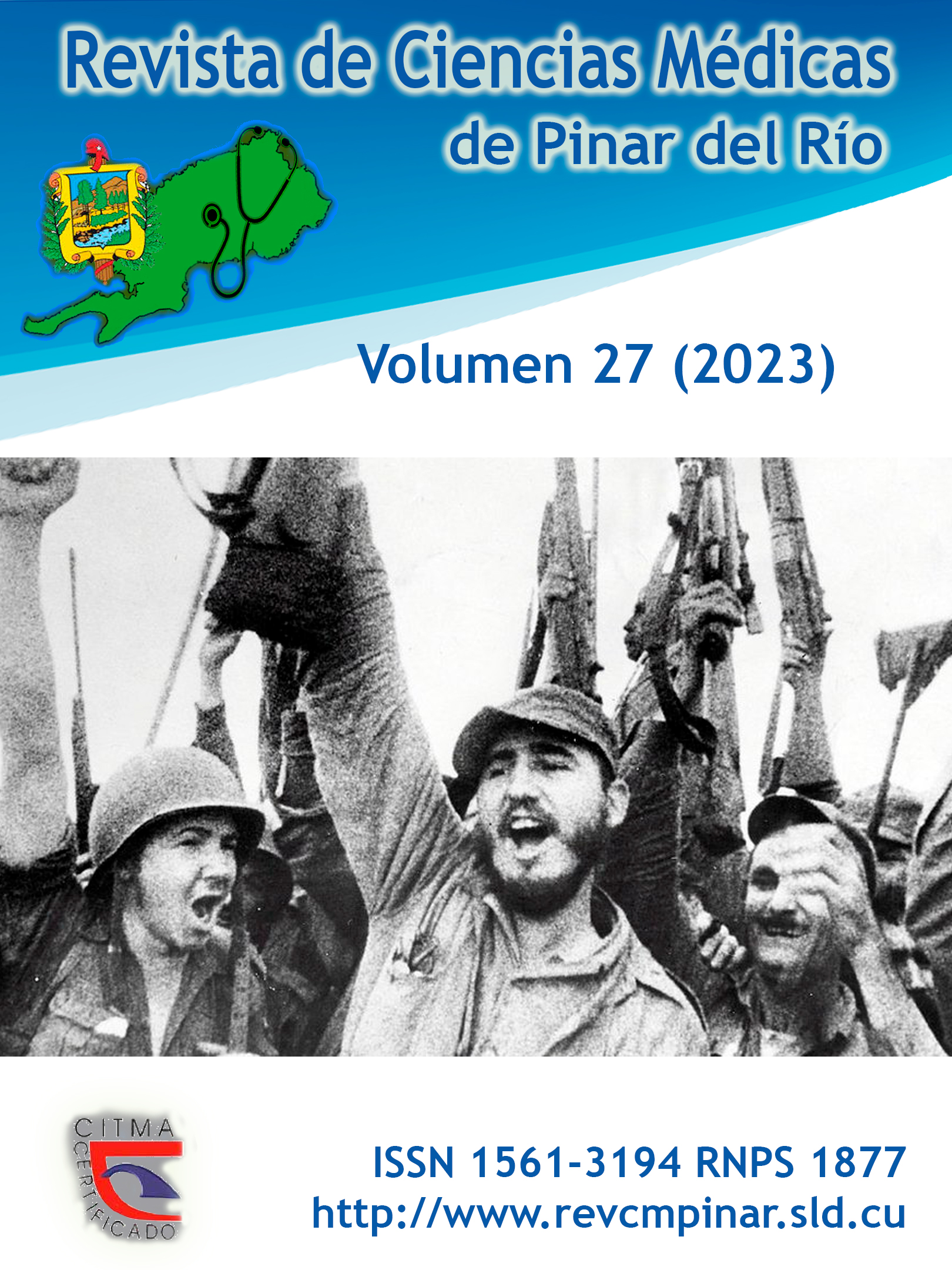Psychological intervention to strengthen resilience in the infertile couple during the artificial insemination period
Keywords:
RESILIENCE, PSYCHOLOGY, POSITIVE, INSEMINATION, ARTIFICIAL.Abstract
Introduction: Infertility has become increasingly prevalent in today's societies. The strengthening of the dyad's resilient capacities in the face of the crisis generated by the inability to procreate favors the dynamic functioning of infertile couples. The Positive Psychology approach allows the enhancement of positive emotions that support the efficacy of the treatment.
Objective: to develop a psychological intervention to strengthen resilience in infertile couples during artificial insemination, in couples attending the Centre for Assisted Reproduction of the "Abel Santamaría" Hospital in Pinar del Río.
Methods: longitudinal study, of mixed approach, the sample consisted of 11 couples undergoing artificial insemination, attended at the Reproduction Centre of the "Abel Santamaría" Hospital in Pinar del Río, between December 2021 and April 2022.
Results: the levels of resilience of the couples were raised to medium-high levels, manifested by a capacity to solve problems with creative alternatives, self-confidence and a positive attitude towards the insemination treatment, and the values of self-efficacy, autonomy and self-esteem were modified to medium-high levels.
Conclusions: The psychological intervention implemented proved to be effective in strengthening resilience in infertile couples during insemination, it managed to promote the resilience of the couple and the knowledge of the strengths of each member, it stimulated positive emotions and attitudes towards insemination to increase success in insemination and in everyday life situations.
Downloads
References
1. Infertilidad [Internet]. MedlinePlus; 2020 [actualizado 2020 Dic 12; citado 27/02/2023]. Disponible en: https://medlineplus.gov/spanish/ency/article/001191.htm
2. Álvarez NA, Alfonso L, Rodríguez ME. Bienestar psicológico y ansiedad rasgo-estado en miembros de parejas con infertilidad primaria. Medimay [Internet]. 2019 [citado 27/02/2023]; 26(1): 75-87. Disponible en: https://www.medigraphic.com/pdfs/revciemedhab/cmh-2019/cmh191h.pdf
3. Antinucci MG. Afrontamiento y regulación emocional en mujeres infértiles [Tesis]. Argentina: Universidad Nacional de Mar del Plata; 2015 [citado 28/02/2023]. Disponible en: http://rpsico.mdp.edu.ar/bitstream/handle/123456789/193/0121.pdf?sequence=1&isAllowed=y
4. Antequera R, Moreno Rosset C, Jenaro C, Ávila A. Principales trastornos psicopatológicos asociados a la infertilidad. Papeles del Psicólogo [Internet]. 2008 [citado 28/02/2023]; 29(2): 167-75. Disponible en: https://www.redalyc.org/articulo.oa?id=77829203
5. Arbitman E. Infertilidad: enfoque psicológico en la pareja [Internet]. 2016 [citado 28/02/2023]. Disponible en: http://infertilidad.tripod.com/psicologia.htm
6. Artuch R. Resiliencia y autorregulación en jóvenes navarros en riesgo de exclusión social, que acuden a programas de cualificación profesional inicial [Tesis]. Pamplona, España: Universidad de Navarra; 2014 [citado 28/02/2023]. Disponible en: https://dadun.unav.edu/handle/10171/36188
7. Barudy J, Dantagnan M. Los buenos tratos a la infancia: parentalidad, apego y Resiliencia [Internet]. Barcelona, España: GEDISA; 2009 [citado 28/02/2023]. Disponible en: https://latam.casadellibro.com/libro-los-buenos-tratos-a-la-infancia-parentalidad-apego-y-resilienci-a/9788497840910/1014631
8. Barco V, Quintero C, Reyes A, Álvarez ZC. El modelo de la adaptación ante la infertilidad de la pareja. Rev Cubana Enfermería [Internet]. 2014 [citado 28/02/2023]; 30(4). Disponible en: https://revenfermeria.sld.cu/index.php/enf/article/view/261/103
9. Santa Cruz DC. Resiliencia al estrés en reproducción asistida [Tesis]. España: Universidad Rey Juan Carlos; 2020 [citado 28/02/2023]. Disponible en: https://dialnet.unirioja.es/servlet/tesis?codigo=300850
10. Cyrulnik B. Los patitos feos. La resiliencia: una infancia infeliz no determina la vida. 5ta ed. Barcelona, España: s/n; 2003.
11. Carmelo O, Gonzalo I, Samuel H. Intervenciones Clínicas basadas en la Psicología Positiva. Fundamentos y aplicaciones. Psicología Conductual [Internet]. 2006 [citado 28/02/2023]; 14(3): 401-32. Disponible en: https://espaciocompartir.inap.es/v3/pluginfile.php/3013/mod_resource/content/2/psicolog%C3%ADa%20positiva.pdf
12. Roca MA. ¿Psicología Positiva… o una mirada positiva de la psicología?. Alternativas cubanas en Psicología [Internet]. 2014 [citado 28/02/2023]; 2(6): 7-15. Disponible en: https://www.alfepsi.org/wp-content/uploads/2014/09/alternativas-cubanas-en-psicologia-vol2-N%C2%B06.pdf#page=10
13. Roca MA. Psicología Positiva o una mirada positiva de la Psicología. La Habana: Editorial HU; 2022.
14. Pérez Figueroa A, González Betancourt L, Valdés Arencibia Y. La resiliencia en la pareja infértil durante el período de inseminación artificial. Revista de Ciencias Médicas de Pinar del Río [Internet]. 2022 Feb [citado 28/02/2023]; 26(1): e5366. Disponible en: https://revcmpinar.sld.cu/index.php/publicaciones/article/view/5366
Downloads
Published
How to Cite
Issue
Section
License
Authors who have publications with this journal agree to the following terms: Authors will retain their copyrights and grant the journal the right of first publication of their work, which will be publication of their work, which will be simultaneously subject to the Creative Commons Attribution License (CC-BY-NC 4.0) that allows third parties to share the work as long as its author and first publication in this journal are indicated.
Authors may adopt other non-exclusive license agreements for distribution of the published version of the work (e.g.: deposit it in an institutional telematic archive or publish it in a volume). Likewise, and according to the recommendations of the Medical Sciences Editorial (ECIMED), authors must declare in each article their contribution according to the CRediT taxonomy (contributor roles). This taxonomy includes 14 roles, which can be used to represent the tasks typically performed by contributors in scientific academic production. It should be consulted in monograph) whenever initial publication in this journal is indicated. Authors are allowed and encouraged to disseminate their work through the Internet (e.g., in institutional telematic archives or on their web page) before and during the submission process, which may produce interesting exchanges and increase citations of the published work. (See The effect of open access). https://casrai.org/credit/



